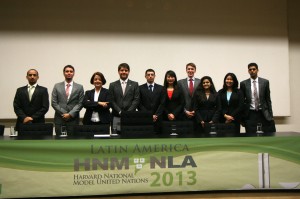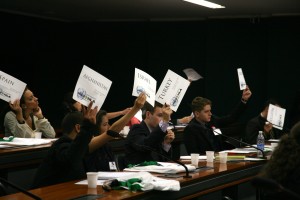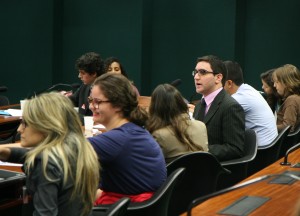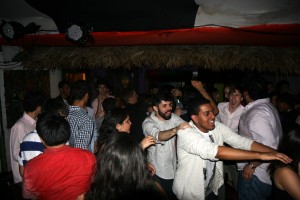Over 250 university delegates convened in the Brazilian capital of Brasília for the second edition of Harvard National Model United Nations Latin America (2013), which was held January 14 to 17, 2013. HNMUN-LA debuted last year in Buenos Aires, Argentina, and continued the tradition of bringing innovative committees to Latin America. This conference was held in the Commission Wing of the Chamber of Deputies in the Brazilian National Congress. The conference was a product of collaboration between the Harvard staff and the Brazilian host team, led by Lucas Almeida and Lucas Carvalho Moreira, students at the University of Brasília and Centro Universitário de Brasília, respectively.
Delegates from six countries and 30 schools attended the conference and engaged in debates in ten committees. The committees varied in geography and history, ranging from the Historical General Assembly’s discussion of 1960s crises in the Congo and a simulation of former Brazilian President Fernando Henrique Cardoso’s cabinet to the League of Arab States’ discussion of present-day challenges in Syria and various GA, ECOSOC, and Specialized Agencies committees’ coverage of pressing issues such as malnutrition, intellectual property protection, and climate change. The Third Party Actors program also brought the diverse perspectives of organizations like CNN, Al Jazeera, and Amnesty International to all committees.
At opening ceremonies, Secretary-General Serena Bai encouraged delegates to treat every moment of the conference as an opportunity to learn, by engaging in formal committee debates and by forging new friendships. Three guest speakers from the Brazilian government also delivered opening remarks about the importance of education and youth engagement, including Ambassador Vera Lucia Machado of the Ministry of Foreign Relations, Mr. Luiz Grochocki of CAPES (Coordenação de Aperfeiçoamento de Pessoal de Nível Superior), and Federal Deputy Luiz Argôlo.
There were also numerous guest appearances throughout the conference, including the State of Rio de Janeiro’s Secretary of Security José Mariano Beltrame and Special Aide to the Commander of the Air Force Gerson Louzeiro. Secretary Beltrame spoke to delegates in the DISEC and UN Human Rights Council committees about the challenges of maintaining security through government, and Mr. Louzeiro helped conference staff plan military crises for the Brazilian cabinet, even appearing as an expert witness in committee.
Outside of committee, delegates socialized at social events held at various venues around Brasília, featuring Latin music, dancing, food and drink, and views of the city. The first day of conference closed with Lounge Night, an evening of caipirinhas, Brazilian treats, and conversation in a relaxing atmosphere. The venue had a beautiful view of Paranoá Lake and outdoor terraces. The second night was Cultural Night, which highlighted Latin music and dancing. The host team put together an energetic playlist of Brazilian favorites, leading delegates to linger long afterhours. The final night was Club Night, held outdoors under a spacious tent. Delegates were treated to a lively mix of Latin, house, and top 40 hits, and the host team also delighted with entertaining surprises and performances throughout the night.
At closing ceremonies, delegates who were popularly elected by their committees to serve as rapporteurs delivered brief speeches about their committees and how they reached consensus on challenging global issues. A common thread throughout the speeches was the delegates’ appreciation of new friendships that began in committee sessions, but would last long after conference ended. As the final gavel struck, the auditorium erupted into applause and cheer as delegates and staff celebrated the conclusion of a successful conference.






